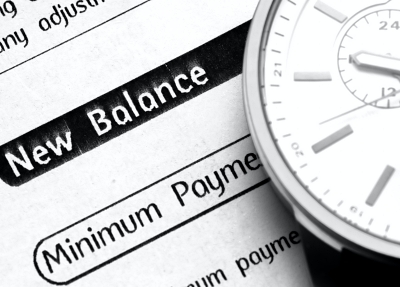
Paying the minimum on a credit card might feel like a way to keep your monthly bills down but it can do real harm to your finances in the long run. While every company has its own policy, the minimum payment is usually the compounded interest for the month plus 1% or 2% of the balance. So, if you're only paying the minimum, you're barely making a dent in your actual debt. In this article, we'll take a look at some consequences of this.
#1 You Pay Way More Than the Original Price
If you just pay the minimum every month, you're going to end up paying more for what you bought with the card than you would have if you bought it with cash. While most people understand this in the abstract, they tend to underestimate just how much more they're paying for things by using a credit card.
So, let's look at an example. Say you bought a new TV with your credit card. The price tag is $1,200. Your credit card's interest rate is 19%. This means your minimum monthly payment, assuming you don't buy anything else with the credit card, will be about $31.
If you pay only the minimum, it will take you 61 months to pay for that TV. That's over five years. By the time you're done paying it off, you'll probably want a new TV again. More importantly, you'll pay the original $1,200 price tag plus an additional $672 in interest. In the end, you're paying almost $1,900 for a TV that was worth $1,200.
#2 Your Credit Score Takes a Hit
If you're using your credit card throughout the month and then only paying the minimum, you're gradually getting closer to maxing out your card. In addition to paying exorbitant amounts of interest, this hurts your credit score by increasing credit utilization.
Credit utilization is the amount of your credit limit that's already spent. If you have a limit of $10,000 and your current balance is $5,000, your credit utilization is 50%. Creditors look for a credit utilization rate below 30% and the closer to zero, the better. Anything above 30% can do serious damage to your credit score.
#3 Your Debt Snowballs
By paying the minimum, you're allowing 98% or 99% of the balance you spent last month to carry over to this month. Then, anything you spend this month will be added to that. Your total debt will start to snowball into unmanageable proportions if you continue this trend.
If you're unable to cover all your monthly expenses without tapping into your credit, that means you're currently living above your means. This isn't sustainable in the long run so it might be time to take a look at your budget and figure out where you can make cuts so that you're not relying on credit cards to get through the month.
#4 Every Dollar Above the Minimum Makes a Difference
Even if you can't really afford to pay the full balance, anything you can afford to add to that minimum amount will help. Consider that $1,200 TV example from earlier. Let's say you can only manage an additional $10 each month above the $31 minimum.
While it doesn't seem like much, it will shave a full 21 months off the time it takes you to pay for the TV and you'll save $248 in interest. So it might feel like you're barely making a difference but, in reality, just $10 each month saved you hundreds of dollars and helped you become debt-free almost two years sooner than if you had just stuck to the minimum.
If you are burdened with high amounts of credit card debt and are struggling to make your payments, or you’re just not seeing your balances go down, call Timberline Financial today for a free financial analysis.
Our team of highly skilled professionals will evaluate your current situation to see if you may qualify for one of our debt relief programs. You don’t have to struggle with high-interest credit card debt any longer.
Call (855) 250-8329 or get in touch with us by sending a message through our website https://timberlinefinancial.com.
 855-250-8329
855-250-8329
